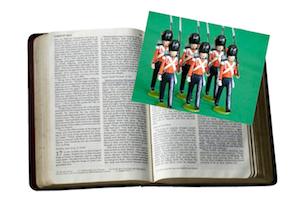 The Conquest of the Promised Land is, for many people, a troubling time in Israel’s history. I’ve talked before about God’s ordering the destruction of the peoples of Canaan; I won’t spend time on it now. What I want to focus on is the role of God in the Conquest.
The Conquest of the Promised Land is, for many people, a troubling time in Israel’s history. I’ve talked before about God’s ordering the destruction of the peoples of Canaan; I won’t spend time on it now. What I want to focus on is the role of God in the Conquest.
He had promised the Israelites that He would drive out the peoples of this land, little by little. He told them that the battles would not depend on the strength of Israel’s army, but on the strength of Israel’s God.
So, what happened? Why were the Israelites unable to complete the Conquest? The Bible points to their unfaithfulness, beginning with the foolishness of the treaty with the Gibeonites. Later passages suggest that they failed to destroy the idols of the nations of Canaan, and that this failure was the biggest contributor to their failings.
In the end, we need to see that the Conquest was the fulfillment of a promise made to Abraham and repeated to his descendants. These battles were fought to secure the land of their inheritance. God was also using them to punish the people of Canaan. Israel was, in this specific instance, the tool of God for punishing the nations, just as were Assyria, Babylon, etc. in later times. This case is unique in that God used His people for this task, but I think that had to do with the Promise.
To some degree, many of the battles fought by Saul and David would have to be included in the Conquest, for they were securing land which had been promised to the Israelites. By my calculations, the Conquest ended with David’s wars, but I’m open to correction on that.

 OK, I’m ready to start looking some at God’s people and war in the Bible. Genesis 14 seems like a good place to start, though someone may want to point out an earlier passage.
OK, I’m ready to start looking some at God’s people and war in the Bible. Genesis 14 seems like a good place to start, though someone may want to point out an earlier passage.